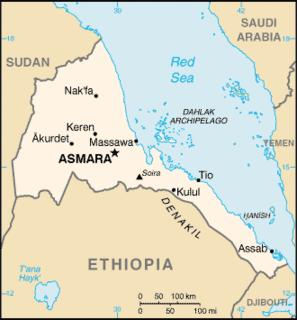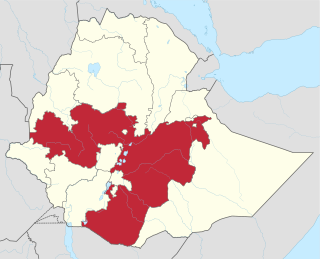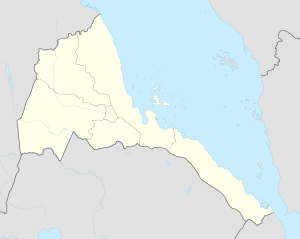The Agordat Operation was part of the Eritrean War of Independence, and took place on 12 July 1962.
It was intended to kill the Ethiopia's Representative in Eritrea, General Abiye Abebe, and other dignitaries who included Asfaha Woldemichael, the head of the Eritrean government and Hamid Ferej, president of the Assembly, who traveled to Agordat that day to address the soldiers and police and to intimidate the residents of Agordat who by that time were receiving news of the movements of the Eritrean Liberation Front on a daily basis.
In the operation, the Eritrean Liberation Front was able to kill 8 Ethiopian dignitaries, while wounding several others. The plan's main target, Abiye Abebe, was not one of the 8 killed. It was planned by Mohamoud Mohamed Salih (Hanjemenjee), and executed by Adem Mohammed Hamid (Ghidifil).

The flag of Eritrea, is the national flag of Eritrea. It was adopted on December 5, 1995. The flag combines the basic layout and colors from the flag of the Eritrean People's Liberation Front with an emblem of a wreath with the upright olive-branch derived from the 1952–1962 flag. The green color in the flag stands for the agriculture and livestock of the country, the blue represents the bounty of the sea, and the red stands for the blood shed in the struggle for Eritrean independence with the 30 leaves in the wreath representing the thirty years spent in the struggle.

An askari was a local soldier serving in the armies of the European colonial powers in Africa, particularly in the African Great Lakes, Northeast Africa and Central Africa. The word is used in this sense in English, as well as in German, Italian, Urdu and Portuguese. In French, the word is used only in reference to native troops outside the French colonial empire. The designation is still in occasional use today to informally describe police, gendarmerie and security guards.

Tsehafi TaezazAklilu Habte-Wold was an Ethiopian politician under Emperor Haile Selassie. He was foreign minister of Ethiopia from 1947 to 1958 and Prime Minister from 1961 until his death by the Derg execution in 1974.

Gash-Barka is an administrative region of Eritrea. It is situated in the south-west of the country, bordering the Anseba region to the north, and the Maekel (Central) and Debub (Southern) regions to the east; the country of Sudan lies to the west and Ethiopia to the south.

The Eritrean Liberation Front(ELF), informally known as Jebha, was the main independence movement in Eritrea which sought Eritrea's independence from Ethiopia during the 1960s and the early 1970s.

The Eritrean War of Independence was a conflict fought between successive Ethiopian governments and Eritrean independence fighters from 1 September 1961 to 24 May 1991.

The Oromo Liberation Front is an Ethiopian political party established in 1973 by Oromo nationalists to promote self-determination for the Oromo people inhabiting today's Oromia Region and Oromia Zone in Amhara Region territory. The OLF has offices in Finfinne (Oromia), Washington, D.C. and Berlin from where it operates Amharic and Oromo radio stations.
Hamid Idris Awate was the founder of the Eritrean Army, and a symbol of the Eritrean struggle for independence.

The Eritrean Civil Wars were two conflicts that were fought between competing organizations for the liberation of Eritrea.

The Ministry of Defense is a cabinet-level office in charge of defense-related matters of Ethiopia. It oversees the Ethiopian National Defense Force and Ethiopian Defense Industry. The current minister is Abraham Belay.

Lieutenant-General LijAbiye Abebe was an Ethiopian politician and son-in-law of Emperor Haile Selassie.

The Battle of Agordat was fought near Agordat in Eritrea from 26 to 31 January 1941, by the Italian army and Royal Corps of Colonial Troops against British, Commonwealth and Indian forces, during the East African Campaign of the Second World War. The British had the advantage of breaking Italian codes and cyphers before the offensive and received copious amounts of information from Italian sources on the order of battle and plans of the Regia Aeronautica and the Italian army.

The Eritrean–Ethiopian border conflict was a violent standoff and a proxy conflict between Eritrea and Ethiopia. It consisted of a series of incidents along the then-disputed border; including the Eritrean–Ethiopian War of 1998–2000 and the subsequent Second Afar insurgency. Ethiopia continued to move deeper into Eritrean territory, bringing under occupation the territories incorporated into its 1997 map and demanding that Eritreans living in these areas acquire Ethiopian nationality or leave. Then a fateful incident happened in the Badme area on 6 May 1998: Ethiopian forces attacked an Eritrean platoon on patrol, killing five officers of the Eritrean Defence Forces (EDF). The border conflict was a continuation of the Eritrean–Ethiopian War of 1998–2000. It included multiple clashes with numerous casualties, including the Battle of Tsorona in 2016. Ethiopia stated in 2018 that it would cede Badme to Eritrea. This led to the Eritrea–Ethiopia summit on 9 July 2018, where an agreement was signed which demarcated the border and agreed a resumption of diplomatic relations.

The Oromo conflict is an armed conflict between the Oromo Liberation Front (OLF) and the Ethiopian government. The Oromo Liberation Front formed to fight the Ethiopian Empire to liberate the Oromo people and establish an independent Oromia state. The conflict began in 1973, when Oromo nationalists established the OLF and its armed wing, the Oromo Liberation Army (OLA). Under the Haile Selassie regime, the Oromo language was banned from use in education and in administrative matters. The Amhara culture dominated throughout the eras of military and monarchic rule. Both the Haile Selassie and Derg governments relocated numerous Amharas into southern Ethiopia, including present day of the Oromia region, where they served in government administration, courts, church and school, where Oromo texts were eliminated and replaced by Amharic. The Abyssinian elites perceived the Oromo identity and languages as hindrances to Ethiopian national identity expansion. Until 1991, the Amhara dominated politics in Ethiopia.
The Battle of Telay was a battle of the Eritrean War of Independence, and took place in mid-1963.

The Ethiopian Unity Patriots Front is a political party and militant rebel organization that waged an insurgency against the Ethiopian government from 1993 to 2012. Formed by ex-officials of the Derg regime, the EUPF was mostly active in Ethiopia's Gambela Region as well as eastern Sudan and South Sudan. The group agreed to a ceasefire with the Ethiopian government in 2012, and officially ended its insurgency in 2016. The EUPF remains active, however, and its armed wing has reportedly been involved in the South Sudanese Civil War, although to what extent is disputed.

The Tigray War is an ongoing civil war that began on 3 November 2020 in the Tigray Region of Ethiopia. The local Tigray Defense Forces (TDF) are fighting the Ethiopian National Defense Force (ENDF), the Ethiopian Federal Police, regional police, and gendarmerie forces of the neighbouring Amhara and Afar regions with the involvement of the Eritrean Defence Forces (EDF). All sides, particularly the ENDF, EDF, and TDF have committed war crimes during the conflict. Due to the onset of the war, a deep humanitarian crisis has developed.
This Timeline of the Tigray War is part of a chronology of the military engagements of the Tigray War, a civil war that began in the Tigray Region of Ethiopia in early November 2020.














